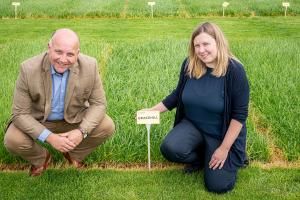The AFBI forage grass breeding programme based at Loughgall, and supported by funding from the Department of Agriculture, Environment and Rural Affairs (DAERA), has reached an important milestone in 2022, marking 70 years of forage grass variety production bred specifically for local use.

The huge success of the programme is clear. Since 1998, 35 improved forage grass varieties have entered forage grass variety recommended lists around the UK and Ireland, at a rate of 1.5 per year. Each of these varieties have been tested against its peers by national testing authorities across the UK and Ireland. They only gain a place on a recommended list once proven to be equal or better to other varieties on the list.
Twenty-eight AFBI-bred varieties are currently included on the Recommended Grass and Clover Lists for England and Wales (RGCL) and eight are recommended for use in ROI, highlighting the longevity and robustness of AFBI varieties to perform year on year consistently across different regions.
AFBI’s portfolio is full of varieties bred specifically for different silage and grazing situations, all of which are marketed in Northern Ireland through AFBI’s commercial partner, Barenbrug UK (Table 1 outlines 14 of AFBI’s leading varieties). However, of particular note is Galgorm, one of the best intermediate heading diploid varieties currently available in the UK. Galgorm first entered recommended lists in the UK in 2018, and has maintained its position as of 2021/22 at the top of the intermediate diploid category for total yield under both grazing and silage management, with no other intermediate diploid variety on the RGCL producing more metabolizable yield per hectare under grazing management. Another outstanding variety on recommended lists across the UK and ROI is Gracehill, a late-heading variety of the tetraploid type, which attained the coveted spot of the best-performing late-heading perennial ryegrass variety in ROI in 2021, cementing its position as one of the very best available forage grass varieties.
| VARIETY | PLOIDY | MATURITY | HEADING DATE | KEY CHARACTERISTICS |
| BANNFOOT | Tetraploid | Hybrid | 20-May | Perennial-type; excellent persistence with yield advantage of hybrid |
| GLASKER | Diploid | Early | 18-May | Excellent first cut yield and spring yields |
| GALGORM | Diploid | Intermediate | 22-May | Highest yielding intermediate diploid |
| MOIRA | Diploid | Intermediate | 24-May | Early spring grazing yield; Excellent disease resistance |
| GOSFORD | Diploid | Intermediate | 29-May | Multi-purpose high quality variety; high crown rust resistance |
| FINTONA | Tetraploid | Intermediate | 20-May | Unrivalled spring grazing yields; Excellent ground cover |
| SEAGOE | Tetraploid | Intermediate | 22-May | High silage yield; Excellent crown rust resistance |
| DUNLUCE | Tetraploid | Intermediate | 30-May | Excellent grazing variety; high digestibility |
| CALLAN | Diploid | Late | 02-Jun | High spring growth, comparable with earlier heading varieties; excellent silage variety |
| BALLYVOY | Diploid | Late | 02-Jun | Excellent quality; superior sward density |
| DRUMBO | Diploid | Late | 04-Jun | Excellent mid and late season growth; superior sward density |
| CLANRYE | Diploid | Late | 05-Jun | Excellent early grazing yield; consistent growth pattern throughout growing season |
| BALLINTOY | Tetraploid | Late | 31-May | Excellent early grazing yield; consistent growth pattern throughoug growing season |
| GRACEHILL | Tetraploid | Late | 01-Jun | Excellent all-round performer right across the growing season |
One of the strengths of the AFBI site at Loughgall is its environment, which is perfect for the production of high yields of grass, allowing AFBI to push its grass varieties to their maximum. This also detects differences between varieties more easily. The site itself lies at a low altitude and is sheltered from the elements with few extremes in temperature and a low risk of frost, but has a rich, fertile soil that is high in calcium and essential nutrients. This, coupled with the high rainfall experienced throughout the year that Northern Ireland is so well known for, leads to typically mild, damp conditions that are perfect for grass production in most growing seasons. Yields at AFBI Loughgall under very high fertilization rates regularly exceed 20 T DM/ha under silage production, highlighting the high yielding potential of the varieties on the site. The AFBI grass breeding programme also maintains one of the best forage grass germplasm collections in the UK, as proven by the high-performing pipeline of varieties originating from the programme.
New varieties currently in development show consistent improvements in traits such as yield, digestibility and disease resistance to improve productivity and raise outputs. But, as both environmental and consumer needs change, the availability of new varieties with improvements for traits such as nutrient efficiency, to offset fertilizer reduction, and carbon sequestration, to help industry meet its net carbon emission goals, are currently being explored. AFBI-bred perennial ryegrass varieties are also key components of a range of multispecies mixtures. Ongoing research is focusing on the role of perennial ryegrasses in multispecies mixtures and the benefits these mixtures can bring. Only through breeding, can sustained improvements in grassland be made. The AFBI forage grass breeding programme aims to be a key part of ‘greener’ livestock production in the future.
Latest news
- AFBI issues Nematodirus warning – Spring 2025 11 April 2025
- Managing Nature Based Risks to the UK Economy and Opportunities for Green Finance 08 April 2025
- AFBI Hillsborough host AERA committee 27 March 2025
- The Omics Days Conference 27 March 2025
